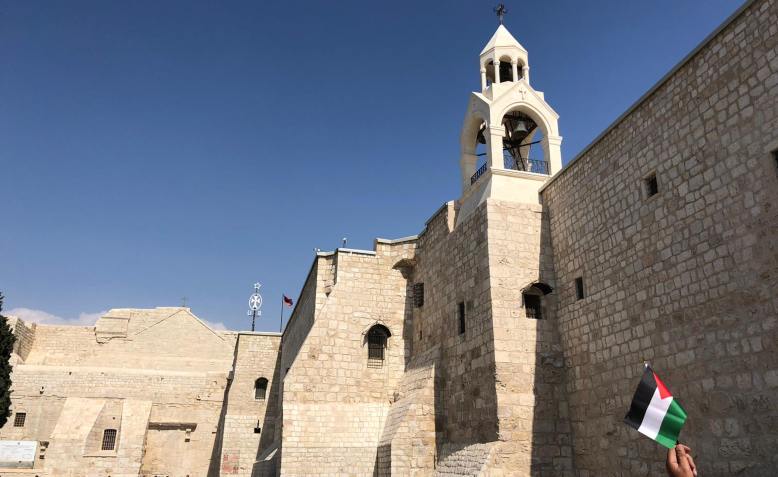 Church of the Nativity, Bethlehem, West Bank. Photo: Shabbir Lakha
Church of the Nativity, Bethlehem, West Bank. Photo: Shabbir Lakha
Detrimental conditions for Palestinians have worsened because of Covid, but they’re caused by the Israeli occupation, argues Shabbir Lakha
Every year, millions of Christian pilgrims travel to the Holy Land, particularly during Christmas. But this year, still in the grips of the pandemic, there were no tourists on the streets of Bethlehem. The processions and Christmas Eve Mass were closed to the public.
Ordinarily, pilgrims start their visit in East Jerusalem, with the Via Dolorosa, the Holy Church of Sepulchre, the Tomb of the Virgin Mary near the Gethsemane Gardens and various revered sites. They can then hop on a tour bus down to Bethlehem just south of Jerusalem, a short half an hour drive away, to the place where Jesus was born.
They are usually completely oblivious to the fact that on that drive to Bethlehem they have gone from illegally annexed East Jerusalem to the occupied West Bank. But even though they can’t experience the Palestinian-erasing facade first hand, Western media outlets have gladly stepped in to reinforce the narrative.
The BBC had ‘Christmas in Bethlehem’ as a news item from the morning of the 24th through Christmas day, which conveniently made no mention of the occupation whatsoever. They said that because of Covid, even Christian Palestinians won’t be able to join the celebrations this year – obscuring the fact that Israel makes it difficult for them always.
Palestinians living in the West Bank are not allowed to enter Jerusalem at all, except in very rare instances if they can get permission from the Israeli military. While it’s a half an hour drive from Jerusalem to Bethlehem, Palestinians in other parts of the West Bank have to take long routes that snake around the numerous Israeli settlements and are littered with checkpoints.
These checkpoints can be arbitrarily closed for any amount of time, or the soldiers can decide to refuse anyone passage, or worse still there is always a danger that any Palestinian going through a checkpoint will end up in prison or dead. Earlier this year, 26 year old Ahmed Erakat was shot dead by Israeli soldiers at the “Container” checkpoint on his way to Bethlehem.
This year, Christians living in Gaza were not allowed to travel at all – but even in previous years, only a small number have been given this temporary reprieve from the siege and with random restrictions. For example, last year only 200 Gazans were allowed to travel to Bethlehem for Christmas, they had to be over 55 years old and were not allowed to enter Jerusalem.
Clearly apartheid
It’s true that the lack of tourism has hit Palestinians in the West Bank hard, unemployment is now at 19%. This is especially true of places like Bethlehem where over 40% of the town’s income comes from religious tourists. But the Palestinian economy is fractured, minuscule and entirely dependent on Israel. It is only contingent on tourism to this extent because Israel has stopped it from being able to develop in any other way.
For example, Palestinians currently have access to only around 13% of the district of Bethlehem. It is cut off from Jerusalem by the Apartheid Wall and huge areas are closed off as military zones or by illegal settlements. There are some 20,000 Palestinians living in refugee camps in Bethlehem, and the town is surrounded by 20 illegal settlements where some 100,000 Israeli settlers live.

The difference between the lives of Israeli settlers and of Palestinians can only be described as apartheid. Aida refugee camp, just 2km from the Church of the Nativity, receives water once or twice a month which they have to store and ration, while the neighbouring settlements have 24/7 pumped water.
Currently, Israel has begun its Covid vaccine rollout – which includes illegal settlers in the West Bank, but not Palestinians. While Israel has already secured 8 million doses and reserved a further 6 million, the Palestinian Authority is dependent on the humanitarian aid from a WHO-led scheme Covax to vaccinate up to 20% of Palestinians.
It will be months before there are any vaccines for Palestinians and it is highly unlikely that the scheme will even manage that considering 9 out of 12 billion doses the pharmaceutical industry estimates it can produce over the next year have already been reserved by rich countries.
While lockdown restrictions to stop the spread of Covid have been a novel experience for people in the UK, no freedom of movement, curfews and checkpoints have been a daily experience for Palestinians for decades.
The health crisis has provided no respite to Israel’s attacks on Palestinians, which have been ramped up in the final days of the Trump presidency. Last month, Israel carried out the biggest demolition of Palestinian homes in a decade making 73 Palestinians, including 41 children homeless. The demolition took place in the Jordan Valley which Israel remains on the verge of annexing in line with Trump’s “deal of the century”.
2020 has seen conditions for Palestinians continue to deteriorate, and 2021 doesn’t promise any better. Our solidarity with Palestine is more necessary now than ever.
Before you go
Counterfire is growing faster than ever before
We need to raise £20,000 as we are having to expand operations. We are moving to a bigger, better central office, upping our print run and distribution, buying a new printer, new computers and employing more staff.

